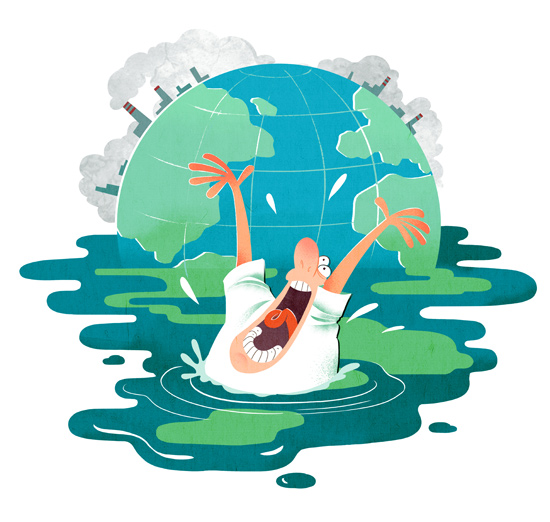
[Photo by Song Chen/China Daily]
By Maria Neira
The climate crisis is also a health crisis. The same emissions that cause global warming are also largely responsible for polluting the air we breathe, causing heart diseases, stroke, lung cancer, and infections, and affecting every organ in the human body. Air pollution is the new tobacco, causing as many deaths as cigarettes do. And although it threatens us all, children, the elderly, pregnant women, and adults with weakened immune systems are the most at risk.
It is now common knowledge that smoking causes severe harm to you and those around you. That is why the tobacco industry's lobbying and advertising campaigns have been strictly regulated around the world. Globally, we have taken steps to safeguard existing health policies, and to force these companies to tell the truth: that their products kill.
Yet our reaction is very different when we learn that air pollution and fossil-fuel-driven climate change are just as deadly. Where are the policies to prevent the fossil fuel industry from lobbying governments, or to end the $370 billion in subsidies lavished on coal, oil, and gas companies every year? Why are we still paying for a product that is killing us?
As with the world's strong response to tobacco, ending harmful fossil fuel use will require scaling up current policy interventions and social mobilization efforts. Fortunately, some multilateral financial organizations have already recognized the opportunity that such a change represents. For example, the European Investment Bank recently announced that it would end all of its funding for unabated fossil fuel projects, and use its position to funnel public and private capital toward renewable energy.
The choice between phasing out fossil fuels and continuing on the current path is black and white-it is a matter of life or death. We either will decide to prevent seven million premature deaths per year by cleaning up our air and providing people with clean energy sources, or we won't. We either will decide to prevent four million childhood asthma cases per year from traffic fumes, or we won't. In any case, the lifetime health of a child born today will be profoundly affected by the decisions we make about climate change now and in the years to come. That is why the World Health Organization has made climate change a top institutional priority.
Climate change should be a priority for all businesses, governments and multilateral organizations, too. Keeping the issue high on the agenda provides the necessary motivation to make difficult choices. By taking action now to reduce carbon dioxide emissions and limit global warming to no more than 1.5 degrees Celsius relative to the pre-industrial level, we would not only ensure that our planet remains hospitable for future generations; we could also save at least one million lives per year, according to WHO's estimates.
Moreover, in countries such as the United States and the United Kingdom, eliminating air pollution would save the economy four percent of GDP per year in averted healthcare costs. In China and India, reducing emissions enough to limit global warming to 1.5 C would more than pay for itself when accounting for the attendant health benefits. Likewise, transforming our food and transportation systems would save still more lives, by providing healthier diets and encouraging more physical activity-all while cleaning the air and stabilizing the climate.
The human right to a healthy life and a sustainable future is increasingly being enforced through legal systems, and officials that fail to uphold these rights are being held accountable. In France, for instance, a court found that the government had failed to do enough to limit air pollution around Paris; similarly, Jakarta residents took legal action against the Indonesian government because of air pollution.
At this year's United Nations General Assembly, many governments answered WHO's call to achieve "air quality that is safe for citizens, and to align climate change and air pollution policies by 2030." Which represents an encouraging first step. Now, many of the countries with the heaviest health burden from air pollution need to phase out their highest-pollution energy sources.
At WHO, we will continue to push for action on these issues, while collaborating with others who are doing the same. On Dec 7, during the UN Climate Change Conference in Madrid, WHO and the Global Climate and Health Alliance will convene a one-day meeting on climate and health, allowing representatives from civil society, the health sector, and all other stakeholders to shine a spotlight on this critical issue.
Like the pollution that causes it, climate change does not observe national borders; it does not save its effects just for those who pollute. On the contrary, inequality is a key feature of the climate crisis: those least responsible for the problem-children, disadvantaged communities, and the Global Southmust bear a disproportionate share of the health burden.
WHO's new global survey, to be launched at the Madrid climate change conference, shows that many countries are highly exposed, vulnerable and unsupported in dealing with health risks from climate change and air pollution. It is clear that we need an international and appropriate response to this increasing strain on public health. Future efforts must reflect the real costs of our fossil fuel-based economy and aid those most affected.
To achieve this, we will need all signatories to the Paris climate accord to strengthen their national climate plans by 2020. Beyond that, we need to establish new, robust mechanisms for protecting the most vulnerable and helping communities adapt to the realities of climate change. Health must be at the heart of our Paris commitments. The pollution that is choking our air and warming our planet has been accumulating for generations. We cannot afford to take that long to fix the problem.
The author is director of the Department of Public Health, Environmental and Social Determinants of Health at the World Health Organization.

 中文
中文



